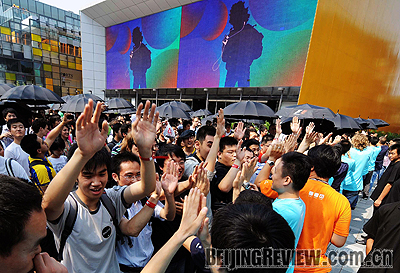| 
BIG PIe: Apple Inc., one of the world’s largest computer producers, opened its first retail store in China in Beijing on July 19. Thousands of PC fans lined up to see its products
Refiners Suffer
PetroChina Co. Ltd. and Sinopec Corp., the country's two largest oil companies, suffered a combined refining loss of 5.71 billion yuan ($837.24 million) in the first half of 2008, 47.9 percent higher than the same period last year, according to a recent report in Shanghai Daily.
The report said rising production costs caused by soaring world crude prices was to blame.
The country's oil companies have been coming under heavy pressure ever since the government capped domestic oil prices to ease inflation.
The government recently increased the benchmark gasoline and diesel oil retail prices to more than 16 percent and 18 percent, respectively. However, these moves will not eliminate further company losses, the report said.
Cheaper Hotels
Hotels in Beijing have cut their room rates 10-20 percent in a last-ditch effort to attract tourists before the opening of the Olympic Games, according to the country's largest online travel service website Ctrip.com.
Three-star hotels have reduced their average room rates to 400 yuan ($59) from 700 yuan ($102) per night. Four-star hotels have cut average room rates to 800 yuan ($117) from 1,500 yuan ($220) per night.
"It's now a trend to entice customers with cheaper rooms, because the occupancy rate is less than expected," Wu Jiaoli, a press officer at NASDAQ-listed Ctrip.com, told China Daily.
Lowering prices at this time could be an effective tactic, because more domestic customers are about to finalize their travel agendas, Wu said.
Airline Independence
China Eastern Airlines Corp. Ltd. (China Eastern), the country's third largest carrier, dismissed speculation about a merger with Shanghai Airlines Co. Ltd.
Rumors circulated earlier that the two carriers had been in merger talks to consolidate aviation resources in Shanghai, one of the country's largest aviation hubs.
In a statement on July 23, China Eastern said it had no merger plans with other airline companies.
The airline signed a preliminary deal last September to sell a 24-percent stake to Singapore Airlines and Lentor Investments, a unit of the Singapore government's investment arm, Temasek Holdings Pte. Ltd. But China Eastern shareholders rejected the bid in January.
Hyundai Reshapes China Strategy
Hyundai Motor Co., South Korea's top automaker, announced on July 23 that it had scrapped a plan to sell a low-cost sedan in China. It said the model would not be profitable, because of rising prices for raw materials, according to a Reuters report.
Hyundai, which together with affiliate Kia Motors Corp., is the world's No.5 automaker. It planned to introduce a new compact sedan in China instead of the originally planned $5,000-$6,000 economy sedan, Hyundai spokesman Jake Jang said in the report.
The company wanted to start selling the low-cost vehicle in China in 2010 to compete with local and global automakers in the world's second largest auto market.
"We will not produce such a cheap car in China," Jang said. "We could not make a profit on the car because of rising commodity prices, and it could damage our brand image."
Networking in Italy
China Potevio Co. Ltd., a telecom equipment maker, will provide equipment to Italian firm Mywave to build a trial 3G network in Italy based on TD-SCDMA, China's homegrown wireless standard, according to an agreement signed on July 18. The network will serve corporate users.
Xing Wei, Potevio's President, told China Daily that the two companies would "jointly tap into the European market" once the TD-SCDMA trial network was completed.
The deal marks the sixth trial network built outside the Chinese mainland. China Mobile has built TD-SCDMA trial networks in 10 domestic cities. Potevio has been a major equipment supplier to China Mobile's TD-SCDMA trial networks in Tianjin and Qinghuangdao. | 